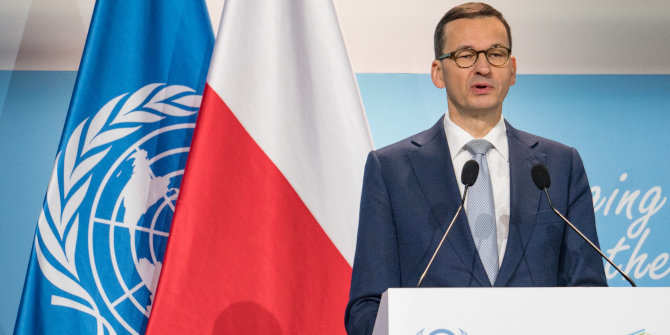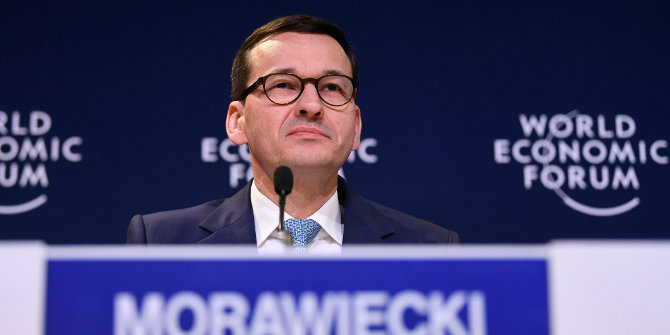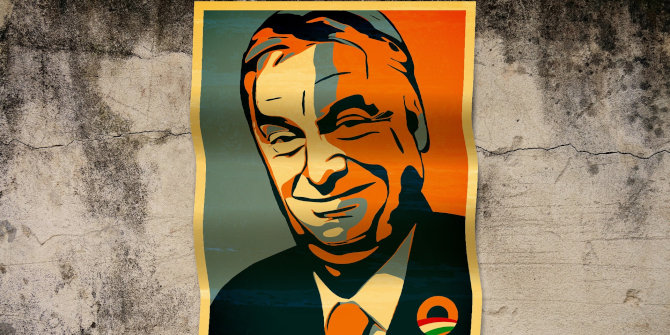 Law and Justice maintained its position in power at the Polish general election in October, but the party may well face a more challenging political and economic environment during its second term in office. Aleks Szczerbiak explains that to govern effectively, Law and Justice will need to win next May’s crucial presidential election, hope the economy remains buoyant enough to fund its social welfare programmes, and develop a credible new political appeal that transcends its slowly exhausting anti-elitist, socio-economic redistribution narrative.
Law and Justice maintained its position in power at the Polish general election in October, but the party may well face a more challenging political and economic environment during its second term in office. Aleks Szczerbiak explains that to govern effectively, Law and Justice will need to win next May’s crucial presidential election, hope the economy remains buoyant enough to fund its social welfare programmes, and develop a credible new political appeal that transcends its slowly exhausting anti-elitist, socio-economic redistribution narrative.
Poland’s ruling right-wing Law and Justice (PiS) grouping won a decisive victory in October’s election, becoming the first governing party to secure re-election with an overall majority, with the largest vote share on the highest turnout in any post-communist Polish parliamentary poll. However, there are a number of reasons why its second term is likely to be much more problematic.
For the next six months, Polish politics will be dominated by the crucially important May 2020 presidential election, when Law and Justice-backed incumbent Andrzej Duda’s five-year term of office ends. The party lacks the three-fifths parliamentary majority required to over-turn a presidential veto, so Duda’s defeat would be a disaster for Law and Justice, seriously hampering the implementation of its legislative programme. Most commentators assumed Duda would win easily given his high popularity ratings, and he remains the clear favourite. However, the parliamentary election showed how polarised and evenly balanced support is for the government and opposition camps, with many voters determined to use any opportunity to block Law and Justice, so the election could be much closer than previously anticipated.
In order to win a presidential election, a successful candidate has to craft a unifying and consensual appeal that can win more than 50% of the vote. So, given that Duda’s political fortunes are tied so closely to the government’s, Law and Justice will try to avoid introducing divisive and polarising measures during this period to prevent drawing the President into sharp political conflicts that could alienate moderate voters.
This ‘no risks’ approach was exemplified by Law and Justice Prime Minister Mateusz Morawiecki’s November keynote policy speech outlining the government’s priorities for the new term. Morawiecki promised repeatedly to defend ‘normality’ and (reprising one of Law and Justice’s main election slogans) build a ‘prosperous state’ (państwo dobrobytu) which, in the Polish context, means both promoting economic modernisation and guaranteeing social welfare. Indeed, his relatively moderate, ‘modernising’ tone was also driven by recognition that the government’s main ideological lodestar can no longer simply be its claim to stand up for ordinary citizens against the alleged pathologies of corrupt and self-serving post-communist elites.
However, if Duda secures re-election, then Law and Justice will face no national polls until the autumn 2022 local elections and could return to deepening and pushing ahead with its radical state reform programme, particularly in areas such as the judiciary, which it still believes is part of a nexus of interests with opposition elites committed to blocking the government’s reforms, and the privately-owned media, to re-balance what it sees as an in-built structural bias favouring the liberal-left.
A more challenging parliament
The relatively even balance of support between the government and opposition camps was illustrated by the fact that Law and Justice lost overall control of the Senate, winning only 48 out of 100 seats, the first time since 1993 that a ruling party has not enjoyed a majority in the second chamber. This was the same number of seats as the three opposition parties: 43 for the liberal-centrist Civic Platform (PO), Poland’s governing party between 2007-15 and currently the main opposition grouping, three for the agrarian-centrist Polish Peasant Party (PSL), and two for the communist successor Democratic Left Alliance (SLD). The balance of power is held by four independents, three of whom won with opposition support, which ensured the election of Civic Platform’s Tomasz Grodzki as Senate speaker, Poland’s third most senior state official.
The Senate confirms the appointment of certain key public officials and can delay the approval of government legislation for up to 30 days, but its significance is more as a political platform, particularly the possibility of interrogating and holding to account ministers and Law and Justice-appointed officials. However, Law and Justice can govern effectively even without a Senate majority, as the second chamber’s amendments can be overturned by an outright majority in the Sejm, Poland’s more powerful lower chamber. Moreover, voters could lose patience with the opposition if it simply obstructs all of the government’s policy initiatives as a matter of course, and there is even a chance that, as the parliamentary term progresses, some Senators could switch to the governing camp and deprive the opposition of its majority.

Mateusz Morawiecki, Credit: UNclimatechange (CC BY-NC-SA 2.0)
At the same time, although Law and Justice won the same number of Sejm seats as last time (235 out of 460), the new legislature will be a much more challenging one. Firstly, the ruling party’s de facto majority in the previous Sejm was actually somewhat larger because it could draw upon support from the (originally 42-strong) right-wing (but very ideologically eclectic) anti-establishment Kukiz’15 caucus. Kukiz’15 deputies frequently voted with the government and several actually defected to Law and Justice outright or to a small pro-government parliamentary grouping led by the Prime Minister’s late father, legendary anti-communist activist Kornel Morawiecki.
The new Sejm will also be more problematic because of the opposition’s greater ideological diversity. The fact that the Polish left has regained parliamentary representation after a four-year hiatus (formally its deputies were elected on the Democratic Left Alliance ticket but they actually represent three different parties) means that Law and Justice faces a much more credible opposition on socio-economic issues, particularly in those areas where many Poles have been dissatisfied with the government’s performance such as the quality of public services.
The left’s new parliamentary intake also contains articulate younger deputies – such as Adrian Zandberg, leader of the small radical left ‘Together’ (Razem) party, who drew praise from opposition-linked commentators for his articulate response to Morawiecki’s policy speech, in sharp contrast to Civic Platform’s much less dynamic and charismatic leader Grzegorz Schetyna. However, it is unclear how the left-wing parties will work together in the new parliament, and if they focus too much on moral-cultural issues they may well undermine their prospects of winning over less well-off but socially conservative voters who might otherwise be receptive to the their socio-economic policies.
Law and Justice also faces a challenge on its radical right flank from the ‘Confederation’ (Konfederacja) grouping, a mix of free marketeers, radical nationalists and social conservatives. The ‘Confederation’ will no doubt call out the ruling party for any perceived ‘centrist’ backsliding, especially on moral-cultural issues such as abortion and sexual minorities, or if they feel that the government is being insufficiently robust in standing up for Polish interests internationally. However, given its ideological eclecticism and the presence of political eccentrics in its parliamentary caucus, the grouping faces an uncertain future.
Tensions within the governing camp
There are also likely to be greater tensions within the governing camp. Formally, Law and Justice is simply the largest component within the ‘United Right’ (ZP) coalition that also comprises the more liberal-conservative ‘Agreement’ (Porozumienie) led by Deputy Prime Minister Jarosław Gowin and the right-wing conservative ‘Solidaristic Poland’ (SP) led by Justice Minister Zbigniew Ziobro. Although many commentators expected these parties to slowly fade from the political scene, they actually picked up seats in the election: the ‘Agreement’ now has 18 Sejm deputies (up from 12) and Solidaristic Poland 17 (previously 7). This is enough for each of them to form a separate parliamentary caucus (which requires 15 deputies) if they were to breakaway, and they already appear to be using this leverage to play a more pivotal role.
For sure, Solidaristic Poland overplayed its hand when Law and Justice leader Jarosław Kaczyński swiftly rejected its suggestion that he should replace Morawiecki, Ziobro’s bitter government rival, as Prime Minister. Although he does not hold any formal state positions, Kaczyński exercises powerful behind-the-scenes influence in determining the government’s programmatic and strategic priorities. However, the ‘Agreement’ forced Law and Justice to drop a controversial plan to increase social security contributions for higher earners as a way of generating extra revenue to fund its social spending pledges.
Law and Justice’s leadership toyed (ultimately unsuccessfully) with the idea of persuading left-wing opposition deputies to vote for this measure, but trying to construct ad hoc parliamentary majorities in this way would, in the longer-term, undermine the governing camp’s coherence and stability even more. So, the ruling party is likely to allow the two smaller groupings a certain amount of leeway as long as they keep within tolerable boundaries. They, in turn, will be careful not to be too assertive given how much they stand to lose if they were to leave the governing coalition.
The proposal to increase social security contributions was one of several additional government revenue raising measures to fund its social spending pledges, specifically to provide bonuses for pensioners, without the state budget going into deficit. Others included larger than expected increases in alcohol and tobacco duties, and taking out loans from the so-called ‘Solidarity Fund’, which was originally intended as a special fund for the disabled financed by a tax on higher earners. Law and Justice faces a much more difficult macro-economic situation in the forthcoming parliament and is unlikely to generate significant extra revenues through measures such as clamping down on tax evasion, as it did in the previous one. Indeed, promising large social transfers has probably reached the limits of its effectiveness as a political tactic.
However, given how critical delivering on these social spending and welfare promises has become to Law and Justice’s broader credibility, the government is moving quickly to implement the pledges that it made during the election, ahead of May’s presidential poll. Moreover, the short-term economic situation remains broadly favourable and the government is hoping that it can keep the economy growing by maintaining consumer demand through continued family subsidies and pension bonuses, investment in publicly-funded infrastructure projects, and incentives for smaller businesses.
Traditionalist-revolutionaries versus modernising-technocrats
The potential sources of tension between Law and Justice and its coalition partners reflect broader divisions within the governing camp. On the one hand, traditionalist-revolutionaries like Ziobro remain committed to pushing ahead with the government’s programme of radical state reconstruction and promoting a conservative vision of national identity and traditional values.
Modernising-technocrats such as Morawiecki also have strong conservative values, and have at times been very critical of Poland’s post-1989 establishment, but believe that Law and Justice has to find more effective ways to reach out to better-off, well-educated voters in larger towns and cities where traditional institutions such as the Catholic Church hold less sway, especially among younger Poles. There appears to have been some strengthening of the ‘technocrats’ within the government, especially in the economic sphere where many of the new appointees, such as Finance Minister Tadeusz Kościński, are closely aligned with Morawiecki. It is also striking that there is no high profile government member clearly identified with the so-called ‘religious right’ for whom moral-cultural issues are a priority.
In his policy speech Morawiecki defended the traditional model of the family and opposed the liberal-left’s moral-cultural agenda on issues such as state recognition of same-sex couples and promoting sex education in schools. Law and Justice has also made gestures towards its traditionalist-revolutionary wing by, for example, nominating two controversial conservative politicians intensely disliked by the country’s legal establishment to vacancies in the constitutional tribunal, a powerful body that rules on the constitutionality of Polish laws.
However, this does not fundamentally alter the party’s long-term pivot to the ‘technocratic centre’. These underlying tensions could come to a head if Kaczyński, who provides a crucial source of cohesion and unquestioned authority to the governing camp, were to stand down from front-line politics. But there is currently every indication that he will remain Law and Justice leader throughout the forthcoming parliament.
Please read our comments policy before commenting.
Note: This article originally appeared at Aleks Szczerbiak’s personal blog. The article gives the views of the author, not the position of EUROPP – European Politics and Policy or the London School of Economics.
_________________________________
 Aleks Szczerbiak – University of Sussex
Aleks Szczerbiak – University of Sussex
Aleks Szczerbiak is Professor of Politics and Contemporary European Studies at the University of Sussex. He is author of Poland Within the European Union? New Awkward Partner or New Heart of Europe?(Routledge, 2012) and ‘Politicising the Communist Past: The Politics of Truth Revelation in Post-Communist Poland‘ (Routledge 2018). He blogs regularly about developments on the Polish political scene at http://polishpoliticsblog.wordpress.com/





Left and Right are meaningless in Poland. The government is left-wing, but it is called right-wing, despite its interventionist economic policies, pro-poor stance and Solidarity trade union backing! The “centre-right” Civic Platform of Donald Tusk utterly rejects the Welfare State and utterly rejects fair taxation of the rich – so in UK terms they would be way to the right of Rees-Mogg!
For example, the Senate is threatening to try to block increases in pensions for the very poorest in society. However, they campaign for huge increases in pensions for retired Communist secret police officers – a very Liberal move 🙂
Instead we have Two Tribes. And they are going to war. One Tribe has massive backing from international capital. Tribal Patriotic Catholicism is fighting Tribal Communism. The descendants of the 1940s AK Resistance is fighting the descendants of the Stalinist Secret Police. And not always just metaphorically.
(And the Catholic Church hierarchy doesn’t support the Tribal Patriotic Catholicism side, because they are majority atheist secret police entryists!! Just like in Mother Russia. The younger clergy can’t wait for them to die off.)
After the implosion of the Kukiz party through his own incompetence (my son joined them so has insight), the political field is now clearly divided between the one anti-Communist party (Law and Justice) and a selection of inheritors of the Communist legacy.
There’s no-one else. Ideology is unimportant – that is the key factor here, and the one that you should keep uppermost in your mind. Parties and voters are otivated by money and tribalism.
The regime transformation — and its aftershocks over the last generation — has produced a small number of people who become extremely rich through “shenanigans” (being polite here – sometimes involving murder) and a large number of people who did well through shenanigans. And they join together with the tribal Communist voters – families of the urban trash who voted quite heavily for the Communists in 1989 (parts of Warsaw voted 30% for them after 45 years of murder and incompetence, Corbyn eat your heart out!).
The policies of the Civic Platform “Liberals” (Tribal Communists) are ultra Hard Right. Victorian social security, almost no tax on the rich – Robin Hood in reverse. 23 of their current MPs worked for the Communist seceurity services in the 1980s!! Their main media supporters have a very strong ex-Communist background. But they are being challenged for leadership of the Tribal Communists by Lewica, meaning ‘Left’ (unrepentant ex-Commies). They played the Soviet anthem at a recent party meeting and call the Red Army ‘Liberators’ of Poland in 1945.
The German Socialist Party SPD set up a party called Wiosna (Spring), which was lionized by BBC World and put gay liberation as its unique selling point. Its high point was in the Euro-elections, but has flopped since. Its role — like Putin’s satellite parties in Russia — was to undermine Tribal Patriotic Catholicism, which makes up the support group for Law and Justice.
To readers amazed by Dave’s tract, you see an example of the sort of stuff appearing on right-wing online fora in Poland, and in the various far-right magazines of dubious means of support appearing on newstands there. The appeal to deep conspiracy theories amid a flurry of wild statements, unsupported by any sources, is typical of Russian-style disinformation intended to create confusion, general distrust and apathy. It has been well documented by multilingual historians and observers such as Anne Applebaum and Timothy Snyder. I don’t believe Davis is acting for Russia, but it’s exactly that type of diatribe which characterises the expression of national authoritarian populisim.